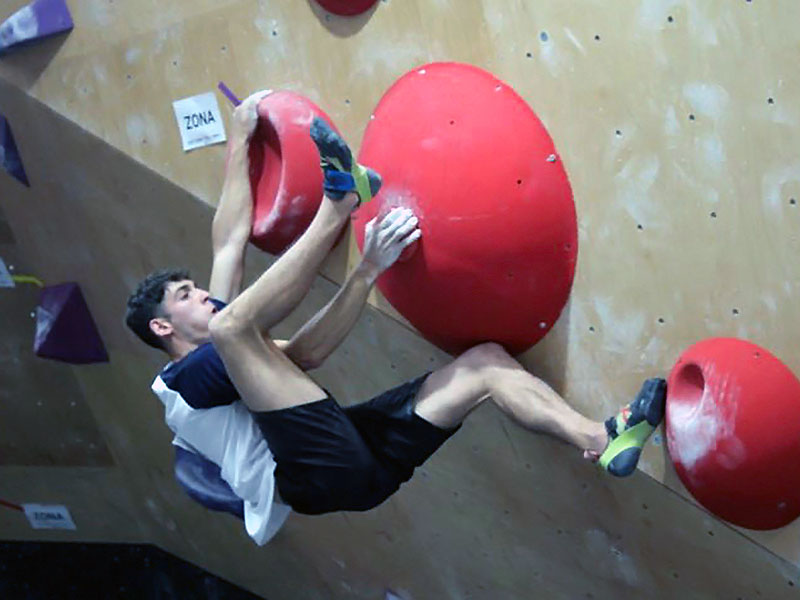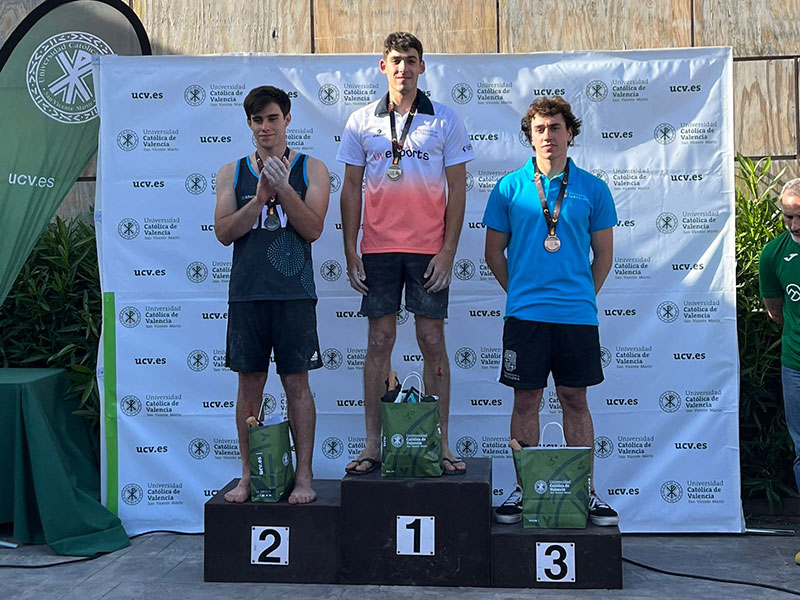
Iker Ortiz: "In Lodz I would like to find a climbing wall with overhangs for more physical climbing". The Universitat de València climber, who will compete in the European University Games in Poland from July 28th to 30th, is finalising his preparation by combining strength and endurance, with competition drills.
The climber from Benigànim combines his undergraduate degree in Physiotherapy at the Universitat de València with a demanding physical and technical preparation. "I usually train strength, endurance and cardio 3 or 4 times a week and at the weekend, if I don't have a competition, I go to the mountains to climb", explains the 22-year-old. "I alternate training sessions at the Natural Climb climbing wall in Valencia with running sessions and strength exercises at the athletic park. In climbing it is important to have endurance and explosive power in both the lower and upper body, it is not only necessary to strengthen arms and grip, leg strength and core strength are also very important" says Iker.
His passion for climbing began at the age of 12, "my father was the one who discovered climbing for me, he took me to the mountains, we have always loved sports in nature, I used to cycle with him and one day I started climbing in the mountains, I got hooked and I never stopped". A decade has passed since then, and Iker has not stopped climbing and achieving success. Before he came of age, he won silver in the Spanish Junior Championships two years in a row. In 2018, already in the senior category, he won silver at the Spanish Championships. The following year, in 2019, he finished second in the Spanish Cup and won the regional championship of the Federación de Deportes de Montaña y Escalada of the Valencian Community. In 2021 and 2022 he won the Regional Championship in the bouldering category. And, at university level, in 2022, he won two gold medals, in the Spanish University Championship (CEU) and in the Regional University Sports Championship (CADU).
Iker already has experience in international competitions, having taken part in tournaments in Portugal, France and Austria, so he is approaching his participation in the Lodz Games with temperance. "I'm really looking forward to Poland, I'm not nervous. I will try to do my best, enjoy myself and have a good time", says Iker, "I am convinced that I will come back from Lodz with a lot of motivation, because a championship of this level will always give you an incentive to keep on motivating yourself in this sport, but it is going to be very difficult for me to obtain a podium place", he adds.

Sport climbing has been included as an Olympic sport for the Tokyo 2020 Games. This competition is made up of three disciplines: bouldering (or boulder climbing), difficulty and speed. Bouldering is practised on low walls of 4.5 metres in height and without any kind of safety element to hold the climber, and in case of a fall, the fall is cushioned by the mat. In difficulty climbing, athletes try to climb as high as possible in 6 minutes, advancing through long routes, and using a rope that protects them from a fall. The third, speed, is in the form of a duel, pitting two climbers against each other as they attempt to reach the top of a 15-metre wall at a 95-degree angle.
"The Lodz Games have been organised like an Olympic Games in which you have to participate in the 3 modalities and the final result is an average of the score obtained in the 3 events", Iker tells us. "I don't have a problem in blocks and difficulty, but in speed I don't have a chance because I haven't been able to train. In the Valencian Community we don't have any climbing wall with these characteristics, you have to go to Madrid or Barcelona", regrets the athlete from Benigànim.
There are three types of climbing classification according to prior knowledge of the route: 'on sight', where the climber has no prior or external information about moves or holds (anchor points on the wall); 'on flash', where competitors have some information, usually because another climber climbs first and everyone sees it; or rehearsed, where the route has been practised beforehand. The climbers carry out the difficulty tests or boulders 'on sight' or 'flash', but the speed test is always carried out in a rehearsed way, as it is done on standardised walls, so "it is vital to have practised on the panel ", says Iker Ortiz. "In an international tournament you face very prepared climbers and scoring badly in one of the tests penalizes a lot, makes you sink in the ranking, which makes it difficult to get on the podium," says the UV climber.
"I've trained a lot to gain agility and power, but no matter how much leg strength you work on, it's difficult to compete with climbers who have spent hours and hours practising on the wall, although I can do the rest well," says Iker. "Every climbing wall is different, the holds are different. The result can vary a lot and it depends on whether you use elements that are better or worse for you, more vertical movements, more overhanging, with one grip or anther... If I could choose, I would like to find a steep and physical climb in Lodz, and I'd like to see the blunt or sliding holds predominate, which I'm better at," says the athlete.
The last weekend of July we will see climbers from the Universitat de València climbing the walls of the Lodz climbing wall. Iker Ortiz and Pau Congost, supported by their coach Mónica Sánchez, will climb the walls of the Polish city, leaving the Universitat de València at the top of the 2022 European University Games.
- More information about the European University Games on the UVEsports website
- Visit the official website of the Lodz games

















